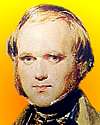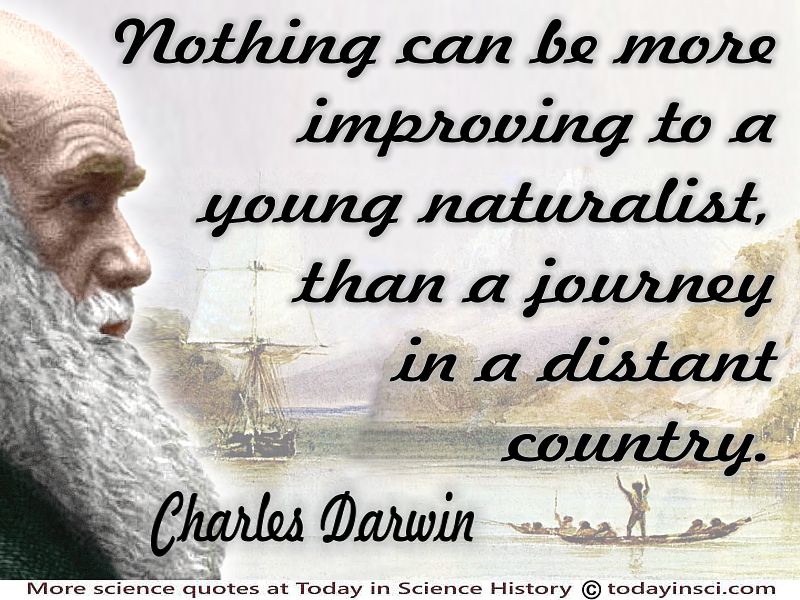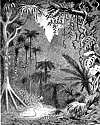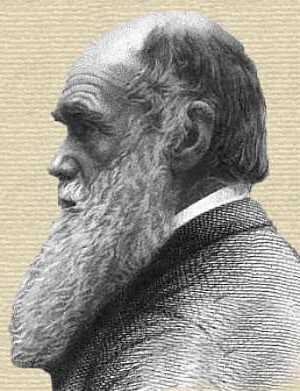 (source)
(source)
|
Charles Darwin
(12 Feb 1809 - 19 Apr 1882)
English naturalist who presented facts to support his theory of the mode of evolution whereby favourable variations would survive which he called 'Natural Selection' or 'Survival of the Fittest.'
|
Charles Darwin Quote
“Improving…a young naturalist”
Illustrated Quote - Large (800 x 600 px)
More Charles Darwin quotes on science >>
Context of Charles Darwin’s quote on “Improving…a Young Naturalist”
After returning from his famous voyage on the H.M.S. Beagle, as the ship's naturalist for Captain Robert FitzRoy, Charles Darwin and the Captain wrote of their experiences in a three-volume series of books. Captain FitzRoy wrote the first two volumes, which include his report on the ship's hydrographic survey, meteorological records and some amateur naturalist contributions.
Darwin described his extensive observations in the third volume, which was subsequently reprinted through many years under a variety of titles, including Journal of Researches and the most familiar, The Voyage of the Beagle. In his later Autobiography, he stated that “the voyage of the Beagle has been by far the most important event in my life, and has determined my whole career.”
In his first published volume, the Journal of Researches, Darwin wrote extensively not only on the great variety of flora and fauna, but also the geology of the regions that he visited. The work remains captivating reading to the present day. It is no wonder that in the conclusion of his book, Darwin portrays his enduring excitement about his five years of travel by recommending the experience to any young man:
“In conclusion, it appears to me that nothing can be more improving to a young naturalist, than a journey in distant countries. It both sharpens, and partly likewise allays that want and craving, which, as Sir J. Herschel* remarks, a man experiences although every corporeal sense is fully satisfied. The excitement from the novelty of objects, and the chance of success, stimulate him to increased activity. …
I have too deeply enjoyed the voyage, not to recommend any naturalist, … to take all chances, and to start, on travels by land if possible, if otherwise on a long voyage.
He may feel assured, he will meet with no difficulties or dangers (excepting in rare cases) nearly so bad as he beforehand anticipated. In a moral point of view, the effect ought to be, to teach him good-humoured patience, freedom from selfishness, the habit of acting for himself, and of making the best of every thing, or in other words contentment. …Travelling ought also to teach him distrust; but at the same time he will discover, how many truly goodnatured people there are, with whom he never before had, or ever again will have any further communication, who yet are ready to offer him the most disinterested assistance.
Thus, in his final words of his last chapter, Darwin's thoughts are not just about the novel things he saw in other parts of the world, but he pays his lasting respect to the people he met along the way.
More quotes on | Evolution | Improvement | Journey | Misery | Naturalist |
- Science Quotes by Charles Darwin.
- 12 Feb - short biography, births, deaths and events on date of Darwin's birth.
- Charles Darwin - Earthquake observation on 20 Feb 1835, during the voyage of the Beagle.
- Charles Darwin - context of quote “If the misery of our poor be caused not by the laws of nature…” - Medium image (500 x 350 px)
- Charles Darwin - context of quote “If the misery of our poor be caused not by the laws of nature…” - Large image (800 x 600 px)
- Charles Darwin - context of quote “Improving…a young naturalist” - Medium image (500 x 350 px)
- Charles Darwin - context of quote “Great is the power of steady misrepresentation” - Medium image (500 x 350 px)
- Charles Darwin - context of quote “Great is the power of steady misrepresentation” - Large image (800 x 600 px)
- Charles Darwin - context of quote “This…I call Natural Selection, or the Survival of the Fittest” - Medium image (500 x 350 px)
- Charles Darwin - context of quote “This…I call Natural Selection, or the Survival of the Fittest” - Large image (800 x 600 px)
- Letter to Asa Gray - from Charles Darwin (5 Sep 1857).
- From So Simple a Beginning: Darwin's Four Great Books, by Charles Darwin, Edward O. Wilson. - book suggestion.
- Booklist for Charles Darwin.




![Charles Darwin quote: About weak points [of the Origin] I agree. The eye to this day gives me a cold shudder, but when I think o](https://todayinsci.com/D/Darwin_Charles/DarwinCharles-WeakThm.jpg)





